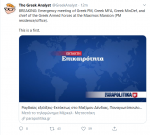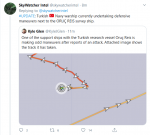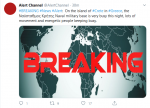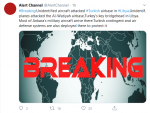You are using an out of date browser. It may not display this or other websites correctly.
You should upgrade or use an alternative browser.
You should upgrade or use an alternative browser.
WAR Regional conflict brewing in the Mediterranean
- Thread starter danielboon
- Start date
-
- Tags
- middle east
northern watch
TB Fanatic
jward
passin' thru
Sotiri Dimpinoudis
@Sotiridi1
10m
#Breaking: German chancellor Angela Merkel and European chair member charles michel, expressed their support towards #Greece in their phone call with Turkish president Erdogan. Told him that #Turkey must stand down and call for dialog between the 2 countries. #Germany #Belgium
@Sotiridi1
10m
#Breaking: German chancellor Angela Merkel and European chair member charles michel, expressed their support towards #Greece in their phone call with Turkish president Erdogan. Told him that #Turkey must stand down and call for dialog between the 2 countries. #Germany #Belgium
northern watch
TB Fanatic
northern watch
TB Fanatic
northern watch
TB Fanatic
jward
passin' thru
..this claim met with much skepticism..
TurkishFacts4u
@TurkishFacts4U
25m
BREAKING: The Turkish Navy has crippled the Hellenic Navy’s electronic systems in response to dangerous manoeuvres against R/C MTA Oric Reis. The Greek vessels have lost all communication. Perhaps the Greeks can confirm in coming hours.

TurkishFacts4u
@TurkishFacts4U
25m
BREAKING: The Turkish Navy has crippled the Hellenic Navy’s electronic systems in response to dangerous manoeuvres against R/C MTA Oric Reis. The Greek vessels have lost all communication. Perhaps the Greeks can confirm in coming hours.
jward
passin' thru
World News
August 13, 2020 / 3:54 AM / Updated 2 hours ago
Amid tensions with Turkey, Greece in joint manoeuvres with France
2 Min Read
Greek and French vessels sail in formation during a joint military exercise in Mediterranean sea, in this undated handout image obtained by Reuters on August 13, 2020. Greek Ministry of Defence/Handout via REUTERS
ATHENS (Reuters) - The French military conducted training exercises with Greek forces off the southern island of Crete on Thursday, defence sources said, as tension persisted with Turkey over disputed waters in the eastern Mediterranean.
Thursday’s exercise was the first manifestation of French President Emmanuel Macron’s commitment to temporarily reinforce his country’s presence in the eastern Mediterranean. France has called on Turkey to halt oil and gas exploration in disputed waters.
Related Coverage
Greek Prime Minister Kyriakos Mitsotakis discussed the situation in the region with Macron by telephone on Wednesday.
On Thursday, the French armed forces ministry said it was sending two Rafale fighter jets and the naval frigate ‘Lafayette’ to the eastern Mediterranean.
The frigate and the jets had arrived in Crete earlier on Thursday and carried out joint manoeuvres with Greek forces, the Greek defence sources said.
“Emmanuel Macron is a true friend of Greece and a fervent defender of European values and international law,” Mitsotakis tweeted, in French, after the call with Macron.
Tensions have simmered between NATO allies Greece and Turkey in recent days over overlapping claims to hydrocarbon resources in Mediterranean waters.
A Turkish seismic vessel, the Oruc Reis, has been sailing between Crete and Cyprus since Monday, despatched by Ankara days after Greece signed a maritime deal with Egypt designating an exclusive economic zone between the two nations.
Turkey says it plans to open up some of the area for potential hydrocarbon exploration, and a precursor to that is collecting seismic data it can process and sell to potential bidders. Both countries lay claim to the area.

 www.reuters.com
www.reuters.com
August 13, 2020 / 3:54 AM / Updated 2 hours ago
Amid tensions with Turkey, Greece in joint manoeuvres with France
2 Min Read
Greek and French vessels sail in formation during a joint military exercise in Mediterranean sea, in this undated handout image obtained by Reuters on August 13, 2020. Greek Ministry of Defence/Handout via REUTERS
ATHENS (Reuters) - The French military conducted training exercises with Greek forces off the southern island of Crete on Thursday, defence sources said, as tension persisted with Turkey over disputed waters in the eastern Mediterranean.
Thursday’s exercise was the first manifestation of French President Emmanuel Macron’s commitment to temporarily reinforce his country’s presence in the eastern Mediterranean. France has called on Turkey to halt oil and gas exploration in disputed waters.
Related Coverage
Greek Prime Minister Kyriakos Mitsotakis discussed the situation in the region with Macron by telephone on Wednesday.
On Thursday, the French armed forces ministry said it was sending two Rafale fighter jets and the naval frigate ‘Lafayette’ to the eastern Mediterranean.
The frigate and the jets had arrived in Crete earlier on Thursday and carried out joint manoeuvres with Greek forces, the Greek defence sources said.
“Emmanuel Macron is a true friend of Greece and a fervent defender of European values and international law,” Mitsotakis tweeted, in French, after the call with Macron.
Tensions have simmered between NATO allies Greece and Turkey in recent days over overlapping claims to hydrocarbon resources in Mediterranean waters.
A Turkish seismic vessel, the Oruc Reis, has been sailing between Crete and Cyprus since Monday, despatched by Ankara days after Greece signed a maritime deal with Egypt designating an exclusive economic zone between the two nations.
Turkey says it plans to open up some of the area for potential hydrocarbon exploration, and a precursor to that is collecting seismic data it can process and sell to potential bidders. Both countries lay claim to the area.

Amid tensions with Turkey, Greece in joint manoeuvres with France
The French military conducted training exercises with Greek forces off the southern island of Crete on Thursday, defence sources said, as tension persisted with Turkey over disputed waters in the eastern Mediterranean.
Sotiri Dimpinoudis
@Sotiridi1
10m
#Breaking: German chancellor Angela Merkel and European chair member charles michel, expressed their support towards #Greece in their phone call with Turkish president Erdogan. Told him that #Turkey must stand down and call for dialog between the 2 countries. #Germany #Belgium
Well that definitely should get Erdogan's attention.....
Posted for fair use.....

 www.reuters.com
www.reuters.com
World News
August 13, 2020 / 12:56 PM / Updated an hour ago
Three Katyusha rockets fell into Iraq’s Balad air base: statement
1 Min Read
CAIRO (Reuters) - Iraq’s Security Media Cell announced on Thursday three Katyusha rockets had fallen into Iraq’s Balad air base, 80 km (50 miles) north of the capital Baghdad, which houses U.S. forces but caused no casualties or losses.
A number of rocket and mortar attacks have hit bases hosting coalition forces and landed near the U.S. embassy in Baghdad in recent months. The United States blames Iran-backed militia groups.
Reporting by Alaa Swilam; Editing by Chris Reese

Three Katyusha rockets fell into Iraq’s Balad air base: statement
Iraq’s Security Media Cell announced on Thursday three Katyusha rockets had fallen into Iraq’s Balad air base, 80 km (50 miles) north of the capital Baghdad, which houses U.S. forces but caused no casualties or losses.
World News
August 13, 2020 / 12:56 PM / Updated an hour ago
Three Katyusha rockets fell into Iraq’s Balad air base: statement
1 Min Read
CAIRO (Reuters) - Iraq’s Security Media Cell announced on Thursday three Katyusha rockets had fallen into Iraq’s Balad air base, 80 km (50 miles) north of the capital Baghdad, which houses U.S. forces but caused no casualties or losses.
A number of rocket and mortar attacks have hit bases hosting coalition forces and landed near the U.S. embassy in Baghdad in recent months. The United States blames Iran-backed militia groups.
Reporting by Alaa Swilam; Editing by Chris Reese
Posted for fair use.....

 www.aljazeera.com
www.aljazeera.com
Libya: Trump talks demilitarised zone with Erdogan
The two leaders also discussed ways to achieve a complete withdrawal of foreign forces and mercenaries from Libya.
12 hours ago
The United States embassy in Libya has announced President Donald Trump and his Turkish counterpart Recep Tayyip Erdogan discussed in a phone call the steps necessary to achieve a demilitarised zone in central Libya.
The two leaders also addressed ways to achieve a complete withdrawal of foreign forces and mercenaries from Libya, and stressed the need to enable the National Oil Corporation to resume its vital work.
The phone call was followed by a visit from US Ambassador Richard Norland to senior Turkish officials in Ankara, where they discussed "the urgent need to support Libyan voices genuinely seeking an end to the conflict and return to UN-facilitated political dialogue, with full respect for Libya's sovereignty and territorial integrity", the US embassy said in a statement on Wednesday.
Earlier in the week, Norland was in Egypt's capital, Cairo, where he discussed with Egyptian officials ways to bring peace to the war-torn North African nation. He also met Tobruk-based Speaker of the House of Representatives Aqila Saleh.
WATCH
00:00
Why Russian mercenaries seized control of key oilfield in Libya
Rival governments
Oil-rich Libya was plunged into chaos when a NATO-backed uprising in 2011 overthrew longtime ruler Muammar Gaddafi, who was later killed. The country has since split between rival east- and west-based administrations, each backed by militias and foreign governments.
In April 2019, the eastern-based forces of renegade military commander Khalifa Haftar launched an offensive to seize the capital, Tripoli, from the internationally-recognised Government of National Accord (GNA).
But Haftar's 14-month campaign collapsed last month when the GNA forces, with Turkish support, gained the upper hand, driving his forces from the outskirts of Tripoli and other western towns. The GNA's military success depended partly on Turkish-supplied drones that pushed back Haftar's self-styled Libyan National Army (LNA) from Libya's skies.
While the GNA is supported by Turkey, Haftar's LNA is backed by Egypt, the United Arab Emirates (UAE), and Russia.
Amid rising tensions, neighbouring Egypt threatened to send troops into Libya if the Turkish-backed GNA forces try to seize the strategic city of Sirte - the gateway to Libya's eastern oilfields.
Last month, the Egyptian parliament gave a greenlight for possible military intervention, but Turkey warned any Egyptian deployment in Libya would hamper efforts to end the fighting.

Libya: US Ambassador, Turkish officials talk ways to end war
US Ambassador Norland discussed steps towards a complete withdrawal of foreign forces and mercenaries from Libya.
Libya: Trump talks demilitarised zone with Erdogan
The two leaders also discussed ways to achieve a complete withdrawal of foreign forces and mercenaries from Libya.
12 hours ago
The United States embassy in Libya has announced President Donald Trump and his Turkish counterpart Recep Tayyip Erdogan discussed in a phone call the steps necessary to achieve a demilitarised zone in central Libya.
The two leaders also addressed ways to achieve a complete withdrawal of foreign forces and mercenaries from Libya, and stressed the need to enable the National Oil Corporation to resume its vital work.
The phone call was followed by a visit from US Ambassador Richard Norland to senior Turkish officials in Ankara, where they discussed "the urgent need to support Libyan voices genuinely seeking an end to the conflict and return to UN-facilitated political dialogue, with full respect for Libya's sovereignty and territorial integrity", the US embassy said in a statement on Wednesday.
Earlier in the week, Norland was in Egypt's capital, Cairo, where he discussed with Egyptian officials ways to bring peace to the war-torn North African nation. He also met Tobruk-based Speaker of the House of Representatives Aqila Saleh.
WATCH
00:00
Why Russian mercenaries seized control of key oilfield in Libya
Rival governments
Oil-rich Libya was plunged into chaos when a NATO-backed uprising in 2011 overthrew longtime ruler Muammar Gaddafi, who was later killed. The country has since split between rival east- and west-based administrations, each backed by militias and foreign governments.
In April 2019, the eastern-based forces of renegade military commander Khalifa Haftar launched an offensive to seize the capital, Tripoli, from the internationally-recognised Government of National Accord (GNA).
But Haftar's 14-month campaign collapsed last month when the GNA forces, with Turkish support, gained the upper hand, driving his forces from the outskirts of Tripoli and other western towns. The GNA's military success depended partly on Turkish-supplied drones that pushed back Haftar's self-styled Libyan National Army (LNA) from Libya's skies.
While the GNA is supported by Turkey, Haftar's LNA is backed by Egypt, the United Arab Emirates (UAE), and Russia.
Amid rising tensions, neighbouring Egypt threatened to send troops into Libya if the Turkish-backed GNA forces try to seize the strategic city of Sirte - the gateway to Libya's eastern oilfields.
Last month, the Egyptian parliament gave a greenlight for possible military intervention, but Turkey warned any Egyptian deployment in Libya would hamper efforts to end the fighting.
Posted for fair use.....

 www.memri.org
www.memri.org
Libya's Muslim Brotherhood Reportedly Seeks To Appoint Jihadi Leader As Head Of Proposed National Guard Amid Concerns New Institution Will Serve As Legal Cover For Armed Militias, Reinforce Turkey's Military Presence In Libya

August 13, 2020
The full text of this post is available to subscribers.
Please login or register to request subscription information from MEMRI
.
Latest Posts

August 13, 2020
Libya's Muslim Brotherhood Reportedly Seeks To Appoint Jihadi Leader As Head Of Proposed National Guard Amid Concerns New Institution Will Serve As Legal Cover For Armed Militias, Reinforce Turkey's Military Presence In Libya
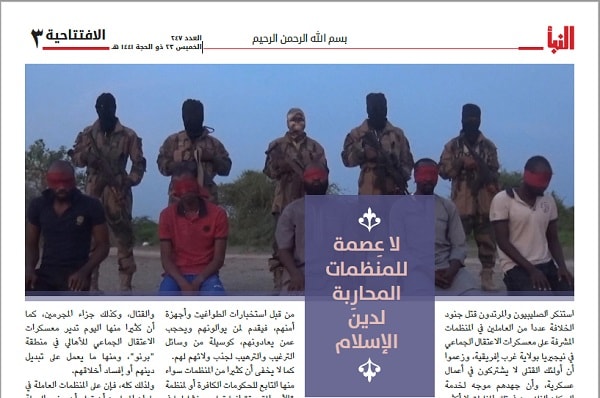
August 13, 2020
ISIS Justifies Execution Of Five Nigerian Aid Workers, Calls On Muslims To Ban Aid Organizations From Operating In Muslim Countries

August 13, 2020
Pro-ISIS Media Group Releases Posters Encouraging Jihad In The Maldives, Attacks, And Media Jihad
Libya's Muslim Brotherhood Reportedly Seeks To Appoint Jihadi Leader As Head Of Proposed National Guard Amid Concerns New Institution Will Serve As Legal Cover For Armed Militias, Reinforce Turkey's Military Presence In Libya
On August 9, 2020, the website of the Saudi channel Al-Arabiya TV reported that the Muslim Brotherhood (MB) in Libya is seeking to appoint Mahmud Bin Rajab, a former member of the now defunct Libyan Fighting Group (LFG), as commander of the National Guard, the formation of which was proposed by...
Libya's Muslim Brotherhood Reportedly Seeks To Appoint Jihadi Leader As Head Of Proposed National Guard Amid Concerns New Institution Will Serve As Legal Cover For Armed Militias, Reinforce Turkey's Military Presence In Libya

August 13, 2020
The full text of this post is available to subscribers.
Please login or register to request subscription information from MEMRI
.
Latest Posts
August 13, 2020
Libya's Muslim Brotherhood Reportedly Seeks To Appoint Jihadi Leader As Head Of Proposed National Guard Amid Concerns New Institution Will Serve As Legal Cover For Armed Militias, Reinforce Turkey's Military Presence In Libya

August 13, 2020
ISIS Justifies Execution Of Five Nigerian Aid Workers, Calls On Muslims To Ban Aid Organizations From Operating In Muslim Countries

August 13, 2020
Pro-ISIS Media Group Releases Posters Encouraging Jihad In The Maldives, Attacks, And Media Jihad
Posted for fair use.....
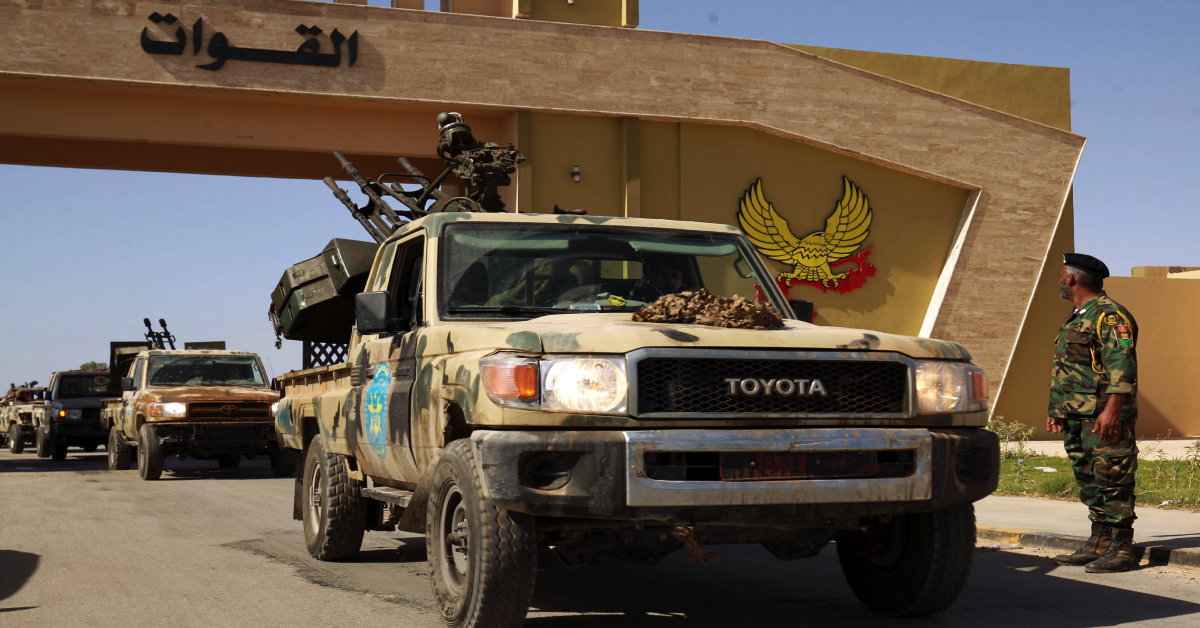
 www.al-monitor.com
www.al-monitor.com
Intel: US engaging with Libya players for possible demilitarization of Sirte
 Members of the self-proclaimed eastern Libyan National Army (LNA) special forces gather in the city of Benghazi, on their way to reportedly back up fellow LNA fighters on the frontline west of the city of Sirte, facing forces loyal to the UN-recognised Government of National Accord (GNA), on June 18, 2020. Photo by Photo by ABDULLAH DOMA/AFP via Getty Images.
Members of the self-proclaimed eastern Libyan National Army (LNA) special forces gather in the city of Benghazi, on their way to reportedly back up fellow LNA fighters on the frontline west of the city of Sirte, facing forces loyal to the UN-recognised Government of National Accord (GNA), on June 18, 2020. Photo by Photo by ABDULLAH DOMA/AFP via Getty Images.

Jared Szuba
@JM_Szuba
Topics covered
Libya conflict
Aug 12, 2020
United States officials have discussed with foreign governments the possibility of establishing a demilitarized area in and around the Libyan city of Sirte, Washington’s Ambassador to Libya Richard Norland said Monday.
“One of the ideas we are suggesting is supporting some sort of a demilitarized solution around Sirte. We are not the only ones who suggested that, but if we can use our influence to do so, we would like very much to do that,” Norland told Cairo-based Ahram Online in an interview.
“The aim is to get forces to pull back, to find some sort of neutral security arrangement for the city itself and to avoid the risk of Sirte becoming a flashpoint for an expanded conflict,” Norland said.
Why it matters: Norland’s comments add depth to reports last week that the Trump administration was engaging in “360-degree” diplomacy with all sides in Libya’s conflict to bring about a cease-fire.
The United States fears the Libyan civil war is on the cusp of developing into a major regional conflict driven by foreign powers.
Never miss another story
Sign up for our Newsletter
Turkey's military and Syrian mercenaries have helped western Libya’s UN-recognized government turn back an offensive launched last year by eastern Libya’s Gen. Khalifa Hifter, who is backed by Russia, the United Arab Emirates and Egypt. Turkey’s intervention, in turn, prompted Hifter’s foreign backers to double down, with Russia sending fighter aircraft and more Wagner Group mercenaries to Libya.
The Tripoli-based Government of National Accord (GNA) is not backing off its threats to press the counteroffensive. Hifter’s foreign patrons have called for a cease-fire but have shown signs of readiness to use force in case the GNA refuses to negotiate — something the United States fears could plunge Libya further into war.
Egypt’s President Abdel Fattah al-Sisi has threatened to militarily intervene if the GNA advances on Sirte, a threat Turkey appears not to take seriously, but the United States does, according to Norland.
What’s next: US officials may be eyeing a potential foot in the door with Cairo.
Egyptian officials told Norland during his trip to Cairo on Monday that Sisi does not want to see “any kind of military action either from the east or the west of Libya, and that Egypt opposes any kind of attack on Tripoli,” the American diplomat told Ahram Online.
If Cairo’s position is serious, it could offer the United States an opportunity for a coordinated push toward an enduring cease-fire, Norland suggested.
“Hearing those assurances from President Sisi — to the extent that growing confidence can be built around those assurances — I think it could have a very powerful impact on what happens next to stabilize the situation further,” the ambassador said.
Whether Egypt would accept a demilitarized Sirte remains to be seen. Spokespeople for the US State Department and for Egypt’s Foreign Ministry did not return Al-Monitor’s requests for comment by publication time.
Know more: Fehim Tastekin explores why Hifter’s backers appear so dead-set on keeping Sirte, even at the risk of fighting Turkey.
More from Jared Szuba

State Department legally skirted Congress freeze on Saudi arms sales, inquiry finds
Aug 11, 2020

Trump Pentagon nominee questioned about firm's link to killing of Saudi journalist
Aug 9, 2020

US military delivers humanitarian aid to Lebanon in wake of Beirut explosion
Aug 6, 2020
Read more: Intel: US engaging with Libya players for possible demilitarization of Sirte

Intel: US engaging with Libya players for possible demilitarization of Sirte
US officials have discussed with foreign governments the possibility of establishing a demilitarized area in and around the Libyan city of Sirte, Washington’s Ambassador to Libya Richard Norland said Monday.
Intel: US engaging with Libya players for possible demilitarization of Sirte


Jared Szuba
@JM_Szuba
Topics covered
Libya conflict
Aug 12, 2020
United States officials have discussed with foreign governments the possibility of establishing a demilitarized area in and around the Libyan city of Sirte, Washington’s Ambassador to Libya Richard Norland said Monday.
“One of the ideas we are suggesting is supporting some sort of a demilitarized solution around Sirte. We are not the only ones who suggested that, but if we can use our influence to do so, we would like very much to do that,” Norland told Cairo-based Ahram Online in an interview.
“The aim is to get forces to pull back, to find some sort of neutral security arrangement for the city itself and to avoid the risk of Sirte becoming a flashpoint for an expanded conflict,” Norland said.
Why it matters: Norland’s comments add depth to reports last week that the Trump administration was engaging in “360-degree” diplomacy with all sides in Libya’s conflict to bring about a cease-fire.
The United States fears the Libyan civil war is on the cusp of developing into a major regional conflict driven by foreign powers.
Never miss another story
Sign up for our Newsletter
Turkey's military and Syrian mercenaries have helped western Libya’s UN-recognized government turn back an offensive launched last year by eastern Libya’s Gen. Khalifa Hifter, who is backed by Russia, the United Arab Emirates and Egypt. Turkey’s intervention, in turn, prompted Hifter’s foreign backers to double down, with Russia sending fighter aircraft and more Wagner Group mercenaries to Libya.
The Tripoli-based Government of National Accord (GNA) is not backing off its threats to press the counteroffensive. Hifter’s foreign patrons have called for a cease-fire but have shown signs of readiness to use force in case the GNA refuses to negotiate — something the United States fears could plunge Libya further into war.
Egypt’s President Abdel Fattah al-Sisi has threatened to militarily intervene if the GNA advances on Sirte, a threat Turkey appears not to take seriously, but the United States does, according to Norland.
What’s next: US officials may be eyeing a potential foot in the door with Cairo.
Egyptian officials told Norland during his trip to Cairo on Monday that Sisi does not want to see “any kind of military action either from the east or the west of Libya, and that Egypt opposes any kind of attack on Tripoli,” the American diplomat told Ahram Online.
If Cairo’s position is serious, it could offer the United States an opportunity for a coordinated push toward an enduring cease-fire, Norland suggested.
“Hearing those assurances from President Sisi — to the extent that growing confidence can be built around those assurances — I think it could have a very powerful impact on what happens next to stabilize the situation further,” the ambassador said.
Whether Egypt would accept a demilitarized Sirte remains to be seen. Spokespeople for the US State Department and for Egypt’s Foreign Ministry did not return Al-Monitor’s requests for comment by publication time.
Know more: Fehim Tastekin explores why Hifter’s backers appear so dead-set on keeping Sirte, even at the risk of fighting Turkey.
More from Jared Szuba

State Department legally skirted Congress freeze on Saudi arms sales, inquiry finds
Aug 11, 2020

Trump Pentagon nominee questioned about firm's link to killing of Saudi journalist
Aug 9, 2020

US military delivers humanitarian aid to Lebanon in wake of Beirut explosion
Aug 6, 2020
Read more: Intel: US engaging with Libya players for possible demilitarization of Sirte
northern watch
TB Fanatic
northern watch
TB Fanatic
jward
passin' thru
EndGameWW3
@EndGameWW3
25m
Senators Menendez and Van Hollen call on Secretary Pompeo to ensure Turkey removes its naval… by Hellenic Leaders
View: https://twitter.com/EndGameWW3/status/1294076823614173187?s=20
@EndGameWW3
25m
Senators Menendez and Van Hollen call on Secretary Pompeo to ensure Turkey removes its naval… by Hellenic Leaders
View: https://twitter.com/EndGameWW3/status/1294076823614173187?s=20
jward
passin' thru
Erdogan says any attack on Turkish ship in Mediterranean dispute will exact 'high price'
3 Min Read
ANKARA (Reuters) - President Tayyip Erdogan said on Thursday that any attack on a Turkish ship exploring for oil and gas in disputed Mediterranean waters would incur a “high price” and suggested Turkey had already acted on that warning.
FILE PHOTO: Turkish President Tayyip Erdogan talks to media after attending Friday prayers at Hagia Sophia Grand Mosque in Istanbul, Turkey August 7, 2020. REUTERS/Murad Sezer
Tensions in the eastern Mediterranean have risen sharply this week after Turkey sent a survey vessel to the region, escorted by warships, in a move Greece decried as illegal.
“We said that if you attack our Oruc Reis you will pay a high price, and they got their first answer today,” Erdogan said in a speech in Ankara without giving details.
The Oruc Reis set out on Monday with its military escort to survey waters between Crete and Cyprus.
In response, President Emmanuel Macron said France would increase its military presence in the region and called on Ankara to stop its exploration work. French and Greek forces held military training exercises off Crete on Thursday.
European Union foreign ministers, who have already imposed sanctions on two Turkish energy executives over Turkey’s operations in the eastern Mediterranean, will discuss the situation on Friday.
Greece’s foreign ministry said Minister Nikos Dendias will brief EU counterparts “about the real facts of the recent days regarding operations in the region” at the emergency meeting.
Erdogan spoke by phone with German Chancellor Angela Merkel and EU Council President Charles Michel on Thursday. He “reiterated his commitment to defend Turkey’s rights against attempts to disregard them”, Erdogan’s office said of the call with Michel.
Both Turkey and Greece said this week that they were willing to resolve the dispute over their overlapping maritime claims, but vowed to protect their interests and blamed the other side for the stand-off.
“If we act with common sense and reason, we can find a win-win solution that meets everyone’s interests,” Erdogan said earlier on Thursday. “We are not chasing any unnecessary adventures or seeking tensions.”
In apparent reference to France, Erdogan also said Greece was being pushed into taking “wrong steps” in the region by “a country that doesn’t even have a coast in the eastern Mediterranean”.

 in.reuters.com
in.reuters.com
3 Min Read
ANKARA (Reuters) - President Tayyip Erdogan said on Thursday that any attack on a Turkish ship exploring for oil and gas in disputed Mediterranean waters would incur a “high price” and suggested Turkey had already acted on that warning.
FILE PHOTO: Turkish President Tayyip Erdogan talks to media after attending Friday prayers at Hagia Sophia Grand Mosque in Istanbul, Turkey August 7, 2020. REUTERS/Murad Sezer
Tensions in the eastern Mediterranean have risen sharply this week after Turkey sent a survey vessel to the region, escorted by warships, in a move Greece decried as illegal.
“We said that if you attack our Oruc Reis you will pay a high price, and they got their first answer today,” Erdogan said in a speech in Ankara without giving details.
The Oruc Reis set out on Monday with its military escort to survey waters between Crete and Cyprus.
In response, President Emmanuel Macron said France would increase its military presence in the region and called on Ankara to stop its exploration work. French and Greek forces held military training exercises off Crete on Thursday.
European Union foreign ministers, who have already imposed sanctions on two Turkish energy executives over Turkey’s operations in the eastern Mediterranean, will discuss the situation on Friday.
Greece’s foreign ministry said Minister Nikos Dendias will brief EU counterparts “about the real facts of the recent days regarding operations in the region” at the emergency meeting.
Erdogan spoke by phone with German Chancellor Angela Merkel and EU Council President Charles Michel on Thursday. He “reiterated his commitment to defend Turkey’s rights against attempts to disregard them”, Erdogan’s office said of the call with Michel.
Both Turkey and Greece said this week that they were willing to resolve the dispute over their overlapping maritime claims, but vowed to protect their interests and blamed the other side for the stand-off.
“If we act with common sense and reason, we can find a win-win solution that meets everyone’s interests,” Erdogan said earlier on Thursday. “We are not chasing any unnecessary adventures or seeking tensions.”
In apparent reference to France, Erdogan also said Greece was being pushed into taking “wrong steps” in the region by “a country that doesn’t even have a coast in the eastern Mediterranean”.

Reuters | Breaking International News & Views
Find latest news from every corner of the globe at Reuters.com, your online source for breaking international news coverage.
Like I said earlier, the area involved is so tight that it is like jamming two knife fighters into a phone booth....
jward
passin' thru
Reuters
@Reuters
4m
Greek and Turkish warships in 'mini collision': defence source https://reut.rs/3422Tce
View: https://twitter.com/Reuters/status/1294225027345387520?s=20
Greek and Turkish warships in 'mini collision': defence source
2 Min Read
Turkish Navy frigate TCG Kemal Reis (F-247) is pictured in the Bosphorus strait in Istanbul, Turkey May 13, 2019. Picture taken May 13, 2019. REUTERS/Yoruk Isik
ATHENS (Reuters) - A Greek and a Turkish warship were involved in a mini-collision on Wednesday during a standoff in the eastern Mediterranean, a Greek defence source said, describing it as an “accident”.
Tensions have risen this week after Turkey sent a survey vessel to the region, escorted by warships, to map out sea territory for possible oil and gas drilling - an area where Turkey and Greece both claim jurisdiction. EU foreign ministers were due to discuss the issue on Friday.
The Turkish Oruc Reis survey ship has been moving between Cyprus and the Greek island of Crete, shadowed by a number of Greek frigates. On Wednesday one of them, the Limnos, was approaching the survey vessel when it came into the path of one of its Turkish naval escorts, the Kemal Reis.
The Greek frigate manoeuvred to avoid a head-on collision and in the process its bow touched the rear of the Turkish frigate, the defence source said.
“It was an accident,” the source said, adding the Limnos was not damaged. It subsequently took part in a joint military exercise with France off Crete on Thursday morning.
There was no immediate comment on the incident from the Turkish ministry of defence.
Turkish President Tayyip Erdogan said on Thursday that any attack on a Turkish ship exploring for oil and gas in disputed Mediterranean waters would incur a “high price” and suggested Turkey had already acted on that warning.
“We said that if you attack our Oruc Reis you will pay ahigh price, and they got their first answer today,” Erdogan saidin a speech in Ankara, without giving details.
Greece and Turkey are allies in NATO but their relations have long been fraught with tension. Disputes have ranged from boundaries of offshore continental shelves and airspace to the ethnically split island of Cyprus. In 1996 they almost went to war over ownership of uninhabited islets in the Aegean Sea.
Reporting by Michele Kambas; Editing by Mark Heinrich
Our Standards:The Thomson Reuters Trust Principles.
Trending
All quotes delayed a minimum of 15 minutes. See here for a complete list of exchanges and delays.
© 2020 Reuters. All Rights Reserved.

 www.reuters.com
____________________________________________________________________________________________
www.reuters.com
____________________________________________________________________________________________
EndGameWW3
@EndGameWW3
3h
Greece – Hellenic Army detected the infiltration of a Turkish submarine in the Strait of Kafireas – ISCResearch
View: https://twitter.com/EndGameWW3/status/1294165145288048640?s=20
@Reuters
4m
Greek and Turkish warships in 'mini collision': defence source https://reut.rs/3422Tce
View: https://twitter.com/Reuters/status/1294225027345387520?s=20
Greek and Turkish warships in 'mini collision': defence source
2 Min Read
Turkish Navy frigate TCG Kemal Reis (F-247) is pictured in the Bosphorus strait in Istanbul, Turkey May 13, 2019. Picture taken May 13, 2019. REUTERS/Yoruk Isik
ATHENS (Reuters) - A Greek and a Turkish warship were involved in a mini-collision on Wednesday during a standoff in the eastern Mediterranean, a Greek defence source said, describing it as an “accident”.
Tensions have risen this week after Turkey sent a survey vessel to the region, escorted by warships, to map out sea territory for possible oil and gas drilling - an area where Turkey and Greece both claim jurisdiction. EU foreign ministers were due to discuss the issue on Friday.
The Turkish Oruc Reis survey ship has been moving between Cyprus and the Greek island of Crete, shadowed by a number of Greek frigates. On Wednesday one of them, the Limnos, was approaching the survey vessel when it came into the path of one of its Turkish naval escorts, the Kemal Reis.
The Greek frigate manoeuvred to avoid a head-on collision and in the process its bow touched the rear of the Turkish frigate, the defence source said.
“It was an accident,” the source said, adding the Limnos was not damaged. It subsequently took part in a joint military exercise with France off Crete on Thursday morning.
There was no immediate comment on the incident from the Turkish ministry of defence.
Turkish President Tayyip Erdogan said on Thursday that any attack on a Turkish ship exploring for oil and gas in disputed Mediterranean waters would incur a “high price” and suggested Turkey had already acted on that warning.
“We said that if you attack our Oruc Reis you will pay ahigh price, and they got their first answer today,” Erdogan saidin a speech in Ankara, without giving details.
Greece and Turkey are allies in NATO but their relations have long been fraught with tension. Disputes have ranged from boundaries of offshore continental shelves and airspace to the ethnically split island of Cyprus. In 1996 they almost went to war over ownership of uninhabited islets in the Aegean Sea.
Reporting by Michele Kambas; Editing by Mark Heinrich
Our Standards:The Thomson Reuters Trust Principles.
Trending
- Israel, UAE to normalize relations in shift in Mideast politics; West Bank annexations on hold
- In China, fears of financial Iron Curtain as U.S. tensions rise
- Trump holds up coronavirus aid to block funding for mail-in voting
- Exclusive: Trump administration asks court to dismiss Big Tech's challenge to social media executive order
- Chinese cities find coronavirus in frozen food imports, WHO downplays infection risk
All quotes delayed a minimum of 15 minutes. See here for a complete list of exchanges and delays.
© 2020 Reuters. All Rights Reserved.

Greek, Turkish warships in 'mini collision' Ankara calls provocative
A Greek and a Turkish warship were involved in a mild collision on Wednesday during a standoff in the eastern Mediterranean, in what a Greek defence source called an accident but Ankara called a provocation.
EndGameWW3
@EndGameWW3
3h
Greece – Hellenic Army detected the infiltration of a Turkish submarine in the Strait of Kafireas – ISCResearch
View: https://twitter.com/EndGameWW3/status/1294165145288048640?s=20
jward
passin' thru

Amir Tsarfati
@BeholdIsrael
23m
The Turkish sultan Erdogan said he is considering the suspensión of Turkey’s relationship with the UAE due to its peace deal with Israel!
_______________________________________
ELINT News
@ELINTNews
4m
Turkey opposing normalisation and peace despite already having an embassy in Tel Aviv and normalised relations with Israel. It seems somewhat rattled about a growing Israel-Arab partnership.
_______________________________________
Aleph א #MissilesDontTalk
@no_itsmyturn
9m
Erdogan says Turkey mulling closing embassy in Abu Dhabi, withdrawing ambassador and suspending diplomatic ties over Israel-UAE agreement Source:
@amichaistein1
View: https://twitter.com/no_itsmyturn/status/1294234842503274498?s=20
jward
passin' thru
..believe he said the ship would be there till the 23rd or 24th. .
EHA News
@eha_news
7m
| #Turkish President #Erdogan once again reaffirms that #Turkey will respond to "even the slightest attack" against the #OrucReis.
View: https://twitter.com/eha_news/status/1294259211652804609?s=20
EHA News
@eha_news
7m
| #Turkish President #Erdogan once again reaffirms that #Turkey will respond to "even the slightest attack" against the #OrucReis.
View: https://twitter.com/eha_news/status/1294259211652804609?s=20
jward
passin' thru
Faytuks News
@Faytuks
1h
BREAKING - The Telegraph reports that Turkey has granted citizenship to multiple senior Hamas operatives
View: https://twitter.com/Faytuks/status/1294242053971468288?s=20
@Faytuks
1h
BREAKING - The Telegraph reports that Turkey has granted citizenship to multiple senior Hamas operatives
View: https://twitter.com/Faytuks/status/1294242053971468288?s=20
danielboon
TB Fanatic
EndGameWW3 Retweeted
Kathimerini English Edition
@ekathimerini
·
2h
#Erdogan says if #Greece continues to attack Oruc Reis, #Turkey will "retaliate"
Kathimerini English Edition
@ekathimerini
·
2h
#Erdogan says if #Greece continues to attack Oruc Reis, #Turkey will "retaliate"
danielboon
TB Fanatic
EndGameWW3 Retweeted
First Squawk
@FirstSquawk
·
24m
RUSSIAN PRESIDENT: DISCUSSIONS ON THE IRAN ISSUE AT THE UN SECURITY COUNCIL ARE BECOMING INCREASINGLY TENSE.
First Squawk
@FirstSquawk
·
24m
RUSSIAN PRESIDENT: DISCUSSIONS ON THE IRAN ISSUE AT THE UN SECURITY COUNCIL ARE BECOMING INCREASINGLY TENSE.
jward
passin' thru
Greek foreign minister hopes to avoid conflict in eastern Mediterranean
2 Min Read
FILE PHOTO: German Foreign Minister Heiko Maas speaks during a news conference at the Ministry of Foreign Affairs in Athens, Greece, July 21, 2020. REUTERS/Alkis Konstantinidis
VIENNA (Reuters) - Greek Foreign Minister Nikos Dendias said on Friday he hoped that all parties involved in a dispute in the eastern Mediterranean Sea will act according to international law and that there will be no conflict.
“I hope there will be no conflict if everybody keeps his mind and everybody acts according to international law, international law of the sea,” he told reporters after discussing Greece’s dispute with Turkey over energy exploration in the eastern Mediterranean with U.S. State Secretary Mike Pompeo in Vienna.
The U.S. State Department said in a statement that the two ministers discussed “the urgent need to reduce tensions in the Eastern Mediterranean” without providing more detail.
The meeting comes on the day it emerged that a Greek and a Turkish warship were involved in a minor collision on Wednesday. A Greek defence source called it an accident, but Ankara described it as a provocation.
The two NATO allies are at odds over overlapping claims for hydrocarbon resources in the region.
“Everything can be resolved, but this is a question that you have to put to the Turks,” Dendias said.
Tensions have risen this week after Turkey sent a survey vessel to the region, escorted by warships, to map out sea territory for possible oil and gas drilling in an area where Turkey and Greece both claim jurisdiction.
Asked whether he agreed with Pompeo on what to do about the issue, the Greek minister said the meeting was “cordial” and the two had “an open explanation of what’s happening”.
European Union foreign ministers, who have already imposed sanctions on two Turkish energy executives over Turkey’s operations in the eastern Mediterranean, were also scheduled to discuss the situation on Friday.
posted for fair use

 www.reuters.com
www.reuters.com
2 Min Read
FILE PHOTO: German Foreign Minister Heiko Maas speaks during a news conference at the Ministry of Foreign Affairs in Athens, Greece, July 21, 2020. REUTERS/Alkis Konstantinidis
VIENNA (Reuters) - Greek Foreign Minister Nikos Dendias said on Friday he hoped that all parties involved in a dispute in the eastern Mediterranean Sea will act according to international law and that there will be no conflict.
“I hope there will be no conflict if everybody keeps his mind and everybody acts according to international law, international law of the sea,” he told reporters after discussing Greece’s dispute with Turkey over energy exploration in the eastern Mediterranean with U.S. State Secretary Mike Pompeo in Vienna.
The U.S. State Department said in a statement that the two ministers discussed “the urgent need to reduce tensions in the Eastern Mediterranean” without providing more detail.
The meeting comes on the day it emerged that a Greek and a Turkish warship were involved in a minor collision on Wednesday. A Greek defence source called it an accident, but Ankara described it as a provocation.
The two NATO allies are at odds over overlapping claims for hydrocarbon resources in the region.
“Everything can be resolved, but this is a question that you have to put to the Turks,” Dendias said.
Tensions have risen this week after Turkey sent a survey vessel to the region, escorted by warships, to map out sea territory for possible oil and gas drilling in an area where Turkey and Greece both claim jurisdiction.
Asked whether he agreed with Pompeo on what to do about the issue, the Greek minister said the meeting was “cordial” and the two had “an open explanation of what’s happening”.
European Union foreign ministers, who have already imposed sanctions on two Turkish energy executives over Turkey’s operations in the eastern Mediterranean, were also scheduled to discuss the situation on Friday.
posted for fair use

Greek foreign minister hopes to avoid conflict in eastern Mediterranean
Greek Foreign Minister Nikos Dendias said on Friday he hoped that all parties involved in a dispute in the eastern Mediterranean Sea will act according to international law and that there will be no conflict.
jward
passin' thru
Faytuks News
@Faytuks
1m
Initial reports of a rocket attack towards Baghdad international airport
Aurora Intel
@AuroraIntel
3m
#Baghdad International Airport, #Iraq has been targeted, at least 3 rockets were reportedly used in the attack.
@Faytuks
1m
Initial reports of a rocket attack towards Baghdad international airport
Aurora Intel
@AuroraIntel
3m
#Baghdad International Airport, #Iraq has been targeted, at least 3 rockets were reportedly used in the attack.
jward
passin' thru
TurkishFacts4u
@TurkishFacts4U
1h
BREAKING: Pakistan says any attack on Turkey is an attack on Pakistan. Turkey now has another nuclear umbrella independent of NATO. EU Govts will now need to think 100 times before escalating the situation in the Eastern Mediterranean as it could lead to nuclear confrontation.
@TurkishFacts4U
1h
BREAKING: Pakistan says any attack on Turkey is an attack on Pakistan. Turkey now has another nuclear umbrella independent of NATO. EU Govts will now need to think 100 times before escalating the situation in the Eastern Mediterranean as it could lead to nuclear confrontation.
TurkishFacts4u
@TurkishFacts4U
1h
BREAKING: Pakistan says any attack on Turkey is an attack on Pakistan. Turkey now has another nuclear umbrella independent of NATO. EU Govts will now need to think 100 times before escalating the situation in the Eastern Mediterranean as it could lead to nuclear confrontation.
Hummm....
So much for Pakistan having Saudi Arabia's back with the weapons the Saudi's help them finance.....
Posted for fair use.....

Pakistan's 'Brotherly' Ties With Saudi Arabia Hit 'Rock Bottom'
A diplomatic spat between close allies Pakistan and Saudi Arabia has exposed serious fissures in their relationship.
 www.rferl.org
www.rferl.org
Pakistan
Pakistan's 'Brotherly' Ties With Saudi Arabia Hit 'Rock-Bottom'
August 13, 2020 09:10 GMT
Pakistan and Saudi Arabia have long cultivated what both Sunni Muslim countries call a "fraternal" relationship.
But the long-standing economic, political, and military ties between the South Asian state and the oil-rich Middle East kingdom have been based less on common values and more on transactions, experts say.
Riyadh has provided huge financial support in the form of cheap oil and loans to Islamabad, which has been reeling for years from a struggling economy and energy crisis.
As the custodian of the two holiest sites in Islam, Saudi Arabia has given legitimacy to Pakistan's political and military elite, which has promoted a conservative Islamic identity in the country.
Riyadh also allegedly helped fund Pakistan's nuclear weapons program in the 1970s.
In return, Pakistan has sent its forces to help defend the kingdom over the decades.
Islamabad has also cooperated closely with Saudi Arabia to curb the expanding influence in the region of Iran -- Pakistan's western neighbor and Riyadh's mortal foe.
The Saudis have also been allowed to spread their extremist Wahhabi version of Islam in Pakistan through a vast network of mosques and seminaries.
But those close ties seem to have hit rock-bottom as the relationship has hit major snags.
'Stand With Us'
In unprecedentedly blunt comments, Pakistani Foreign Minister Shah Mahmood Qureshi lashed out at Saudi Arabia for its perceived lack of support for Islamabad's interests in the disputed Kashmir region.
The Muslim-majority Himalayan region is divided between Pakistan and archrival India but claimed by both in its entirety. The two countries have fought three wars over the region.
Qureshi said on August 5 that Islamabad expected the Organization of the Islamic Conference (OIC) -- a group of 57 Muslim countries from Africa, the Middle East, and Asia that is based in Saudi Arabia -- to convene a meeting on Kashmir.
Otherwise, he said, Pakistan would be "compelled" to "call a meeting of the Islamic countries that are ready to stand with us on the issue of Kashmir," which has been viewed as a threat to create a new bloc that would rival the Saudi-dominated OIC.
The foreign minister mentioned Iran, Turkey, and Qatar, Riyadh's regional rivals with which Pakistan has bolstered ties in recent years.
Qureshi said Pakistan last year pulled out of an international summit for leaders of Muslim countries in Malaysia because of Riyadh's concerns that the meeting could undermine the OIC.
But now, he said, Pakistan was demanding Riyadh "show leadership on the issue" of Kashmir. "We have our own sensitivities," he said. "Gulf countries should understand this. I'm taking a position despite our good ties with Saudi Arabia. We cannot stay silent anymore on the sufferings of the Kashmiris."
Qureshi's comments came on the first anniversary of India's decision to revoke the special status of territory under its administration in Kashmir, a move that outraged Pakistan.
Pakistan's Foreign Office on August 6 defended Qureshi's rare public criticism of Riyadh, saying the minister's remarks reflected the "people's aspirations and expectations."
Game Of Loans
The same day, media reports in Pakistan said the government was forced to repay $1 billion of a $3 billion loan it had secured from Saudi Arabia.
Those loans were part of a $6.2 billion package announced by Saudi Arabia in October 2018, which included a total of $3 billion in loans and a further $3.2 billion loan for oil imports.
Media reports also said Pakistan had not received any oil under the deal since May.
In February, Saudi Crown Prince Muhammad bin Salman signed investment deals with Pakistan worth $20 billion, including for a $10 billion refinery and petrochemicals complex in the port city of Gwadar.
Pakistani Prime Minister Imran Khan was criticized and even mocked on social media for chauffeuring for the crown prince upon his arrival in Islamabad, a move intended to portray the kingdom's importance to Pakistan.
On August 10 -- just days after Qureshi's outburst, the Saudi ambassador in Islamabad met with Pakistan's chief of army staff, General Qamar Javed Bajwa. The military holds an oversized role in the country's domestic and foreign affairs.
A Pakistani government statement said that "matters of mutual interest, the regional security situation, and bilateral defense relations between the two brotherly countries were discussed during the meeting."
'Ungrateful'
"The Saudis have stood by Pakistan in times of need," says Husain Haqqani, Pakistan's former ambassador to the United States and a director at the Washington-based Hudson Institute. "But Riyadh feels Pakistan is less forthcoming in supporting Saudi Arabia on its security concerns while demanding both economic assistance and political support."
Pakistan failed to send troops to help a Saudi-led coalition that has been fighting Huthi rebels in Yemen since 2015.
Meanwhile, Islamabad is wary of the burgeoning economic ties between Riyadh and New Delhi. Saudi Arabia has become India's fourth-largest trading partner and the main source of its oil imports, with bilateral trade at $27 billion annually.
In comparison, Pakistan's bilateral trade with Saudi Arabia stands at just $3.6 billion.
"The Saudis look at Pakistan as an ungrateful recipient of their assistance, including direct budget support, oil supplied on a deferred-payment basis, and several hundred thousand jobs for unskilled workers," Haqqani says. "But for the Saudis, India is a major trading partner and they are refusing to play Islamabad's zero-sum game on India."
In recent years, Saudi Arabia has expelled thousands of Pakistanis for not possessing valid legal documents, although some observers say the expulsions are the consequences of worsening diplomatic relations.
Saudi Arabia remains the main source of Pakistan's remittances. Overseas Pakistani workers sent nearly $19 billion home between July 2019 and April 2020, with $4.4 billion remitted from Saudi Arabia alone, according to the State Bank of Pakistan.
Mosharraf Zaidi, a Pakistani columnist and former diplomat, says the diplomatic row will have "implications" for Islamabad, adding that the government has made "a habit of making bombastic statements about the closest strategic partners of the country."
"Saudi Arabia is not a casual partner of the country," Zaidi says.
Najam Sethi, a prominent Pakistani journalist, wrote in a column that Pakistani-Saudi ties had "hit rock-bottom already" and Qureshi's "outburst is a consequence of this fact rather than a cause of it."
Imtiaz Gul, head of the independent Center for Research and Security Studies in Islamabad, says the spat with Riyadh is an "expression of frustration with the lack of Saudi support on Kashmir and its close economic relations with India."
But he says it does not signal a strategic realignment by Islamabad, which has forged warmer ties recently with Iran. "Pakistan will largely remain aligned with Saudi Arabia and the other OIC countries, including Turkey," Gul says. "The relationship with Iran has been tricky and very wobbly from the very beginning. And I don't expect it to reach to the level of our relationship with Turkey or Saudi Arabia."
'Thoughtless'
Pakistani opposition parties and political commentators have slammed the government for its public criticism of Riyadh, arguing that Islamabad cannot afford to alienate its Saudi benefactors.
Khurram Dastagir, a former defense minister and central leader of the opposition Pakistan Muslim League-Nawaz (PML-N) party of ousted Prime Minister Nawaz Sharif, said Qureshi's remarks were "most unfortunate and ill-advised" because "we have a long-standing relationship with Saudi Arabia."
Dastagir said that "if there are differences, they should not be expressed in the unfortunate manner as said by the foreign minister."
Farhatullah Babar, a former senator and central leader of the Pakistan Peoples Party (PPP), told RFE/RL that Qureshi's statement was "irresponsible, thoughtless, and undiplomatic."
Last edited:

